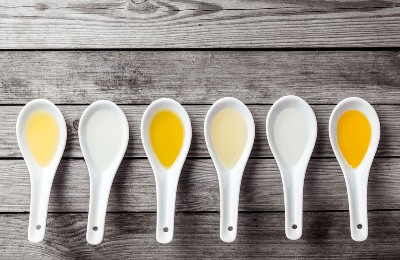Cooking Oils 101

by Epicurious EmQUOTE: “Do you think Olive Oyl was a virgin?” --PopeyeSolvent extracted oils are made using oil extracted from plants along with chemicals. Depending on manufacturing and quality control standards, microscopic amounts of chemicals may remain.
These oils are low in quality, as reflected in their cost. We must exercise caution so that we are not buying GMO altered oils. Examples of genetically engineered oils: soy, corn, vegetable, and canola.
Expeller pressed oils are made using a mechanical press to extract oil from seeds, producing clean, pure oil that doesn’t contain any chemical residues.
Unrefined oils are filtered slightly to remove large particles. They have more pronounced flavors, colors, and fragrances. Unrefined oils are more nutritious and have a shorter shelf life than refined.
Refined oils are made using a process that is more thoroughly filtered and strained than unrefined and without harsh or damaging chemicals. Refined oils are more stable for longer storage, more resistant to smoking, and a good choice for high-heat cooking.
Cooking oils are heat sensitive, and it is very important to choose your oil based on the amount of heat you need to make your dish. The #1 Rule is if you see smoke, start over using a different oil or cooking at a lower temperature. It is highly beneficial to use a variety of oils, as our bodies benefit from the nutrients found in different oils.
All oils have about 120 calories and 14 grams of fat per tablespoon. Here are some basic cooking oil guidelines.
GOOD FOR SEARING, BROWNING, FRYING, AND GENERAL COOKING
Almond – High heat dishes and desserts
Avocado – Searing meat, stir-fry, salad dressing
Safflower – Chicken and pasta
Sunflower – Sautéing vegetables
Peanut – Fish, tempura, stir-fry, Asian, turkey frying
GOOD FOR BAKING, OVEN COOKING, CRISP SAUTÉS AND STIR-FRYING
Extra Virgin Olive – Sautés, sauces, cold dishes, salads, pesto
Grape seed – Vinaigrettes and sautéing vegetables
GOOD FOR LIGHT SAUTÉS, LOW-HEAT BAKING, AND SAUCES
Coconut – Butter and shortening substitute, soups, stews, and curries
Sesame – Low heat stir-fry and Asian sauces
Soybean – Light vegetable and meat sautés
Walnut Oils – Salad dressings, pasta tosses
GOOD FOR NO-HEAT DRESSINGS, SAUCES, AND DIPS
Flaxseed – Dressings, cold dips and sauces, drizzled or mixed into warm dishes
Wheat Germ – Dressings, cold dips and sauces, drizzled or mixed into warm dishes
TIP: Store in dark glass bottles in cool area. Limit air, excessive heat, and light. A highly recommended purchase is the Kirkland Signature Brand Extra Virgin Italian Olive Oil available at Pricesmart. Great value and quality!
Epicurious Em welcomes your comments and suggestions. The information in this article provides basic information only. It is always good to do your own research for what is best for your dietary and cooking needs. Feel free to e-mail me at em@playacommunity.com.
Trending Tags
